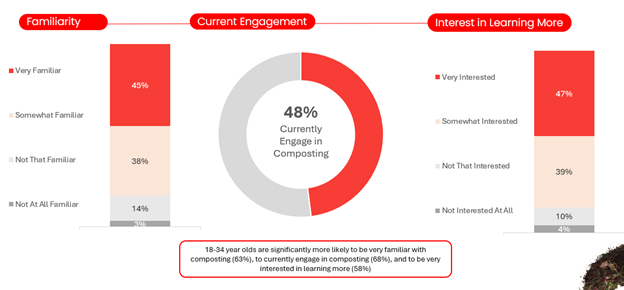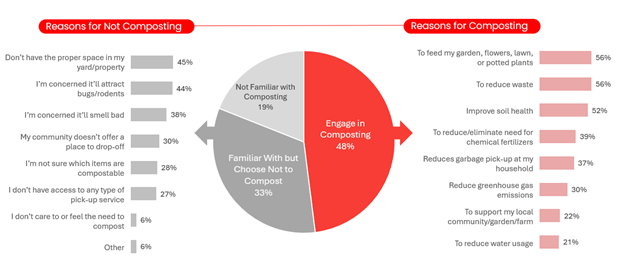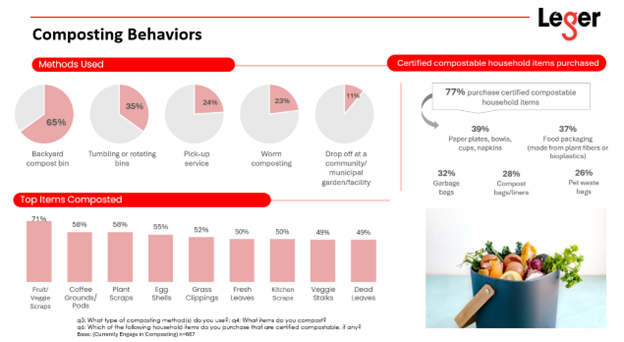Composting—once a practice reserved for the most dedicated environmentalists—has blossomed into a mainstream movement, reflecting a broader shift in societal attitudes toward waste reduction and environmental stewardship.
As communities worldwide confront the escalating challenges of climate change and landfill overflow, the appeal of turning organic waste into nutrient-rich soil has grown exponentially. This shift is not just about managing waste more effectively. It’s also a testament to a collective awakening to the impacts of our daily choices on the planet’s health.
Leger surveyed members of our health and wellness community to see whether they have been embracing composting.
This survey is just the beginning of the wide scope of questions that you can ask Leger’s market research online communities. Contact us to learn more about our MROCs.
U.S. consumers are actively composting
As composting becomes more prevalent among the populace, Leger surveyed our health and wellness community to discover their attitudes and behaviors toward composting.

*based on a sample size of 1,385 U.S. consumers
Our latest data paints an encouraging picture: nearly half (48%) are currently engaged in composting, indicating a significant shift toward sustainable waste management practices.
Composting is becoming mainstream
Composting is not just a practice adopted by seasoned environmental enthusiasts. A remarkable 45% of individuals report being very familiar with the process, suggesting that it is becoming mainstream.
The younger demographic, particularly those aged 18-34, are leading the charge in this green revolution. They are significantly more likely to be very familiar with composting (63%), actively engage in it (68%), and express a keen interest in deepening their understanding (58%).
Willingness to learn more exists, even among those who do not compost
Eagerness to learn more about composting is striking, with 47% of people very interested in expanding their knowledge. This enthusiasm is coupled with a substantial 39% who are somewhat interested, painting a picture of a community poised to embrace composting even more fully in their daily lives.
Reasons for not composting are plentiful
Composting stands at a crossroads of intent and action. Among those who do not compost, the significant deterrents are concerns over space, with 45% citing a lack of proper yard or property area, and worries about attracting pests (44%) or foul odors (38%).
These apprehensions are coupled with logistical challenges: 30% lack community composting facilities and 27% don’t have access to pick-up services.

- Sample size: 1,385
- Those who do not compost: 456
- Those who do compost: 667

On the flip side, the motivations for those who compost are robust and rooted in environmental stewardship.
A strong majority (56%) compost to nourish their gardens and reduce waste, signifying a deep understanding of the cycle of regeneration. Improving soil health is a priority for 52%, indicating an awareness of the broader ecological benefits. Additionally, 39% aim to cut down on chemical fertilizers, and 37% see composting as a means to decrease household garbage pick-up. The desire to mitigate greenhouse gas emissions resonates with 30%, aligning personal actions with global climate goals.
The art of composting is blossoming into a refined practice among those committed to a greener future. A striking 65% of composting enthusiasts are turning their kitchen scraps and yard trimmings into garden gold using backyard compost bins, signaling a strong preference for this traditional method.
Not far behind, 35% are rotating their contributions to the compost cycle with tumbling or rotating bins, introducing efficiency into the age-old process. A notable 24% leverage pick-up services, underscoring the desire for convenience in sustainability efforts, while 23% delve into the intricate world of worm composting, harnessing nature’s recyclers to enrich their soil.
When it comes to giving compostable materials a second life, fruit and vegetable scraps take the lead at 71%, followed closely by coffee grounds/pods and plant scraps, both at 58%, demonstrating a broad understanding of compostable materials. Garden refuse such as grass clippings and leaves are also frequently returned to the soil, at rates of 55% and 50% respectively, illustrating the cycle of growth, decay, and rebirth that lies at the heart of composting.
Purchasing compostable products is on the rise
The commitment to composting extends beyond the garden, with a significant 77% of individuals purchasing certified compostable household items. This trend is marked by the choice of 39% for paper plates, bowls, cups, and napkins, and 37% for food packaging made from plant fibers or bioplastics, indicating a shift towards products that align with environmental values.
Keep pace with Leger
This survey is just the beginning in Leger’s quest to bring you the insights you need on sustainability and wellness. In the realm of health and wellness, the community’s pulse is ever-evolving and keeping a finger on its dynamic beats is crucial.
Leger leverages over 15 years experience in the health & wellness community to offer data and insights on issues affecting those who care about them most. Through this platform, we harness the power of data to navigate the complexities of health trends, wellness practices, and the overarching well-being narrative that shapes our lives.
Stay tuned as we highlight a community where every insight is a stepping stone to greater understanding and enriches our collective journey toward healthy living.

